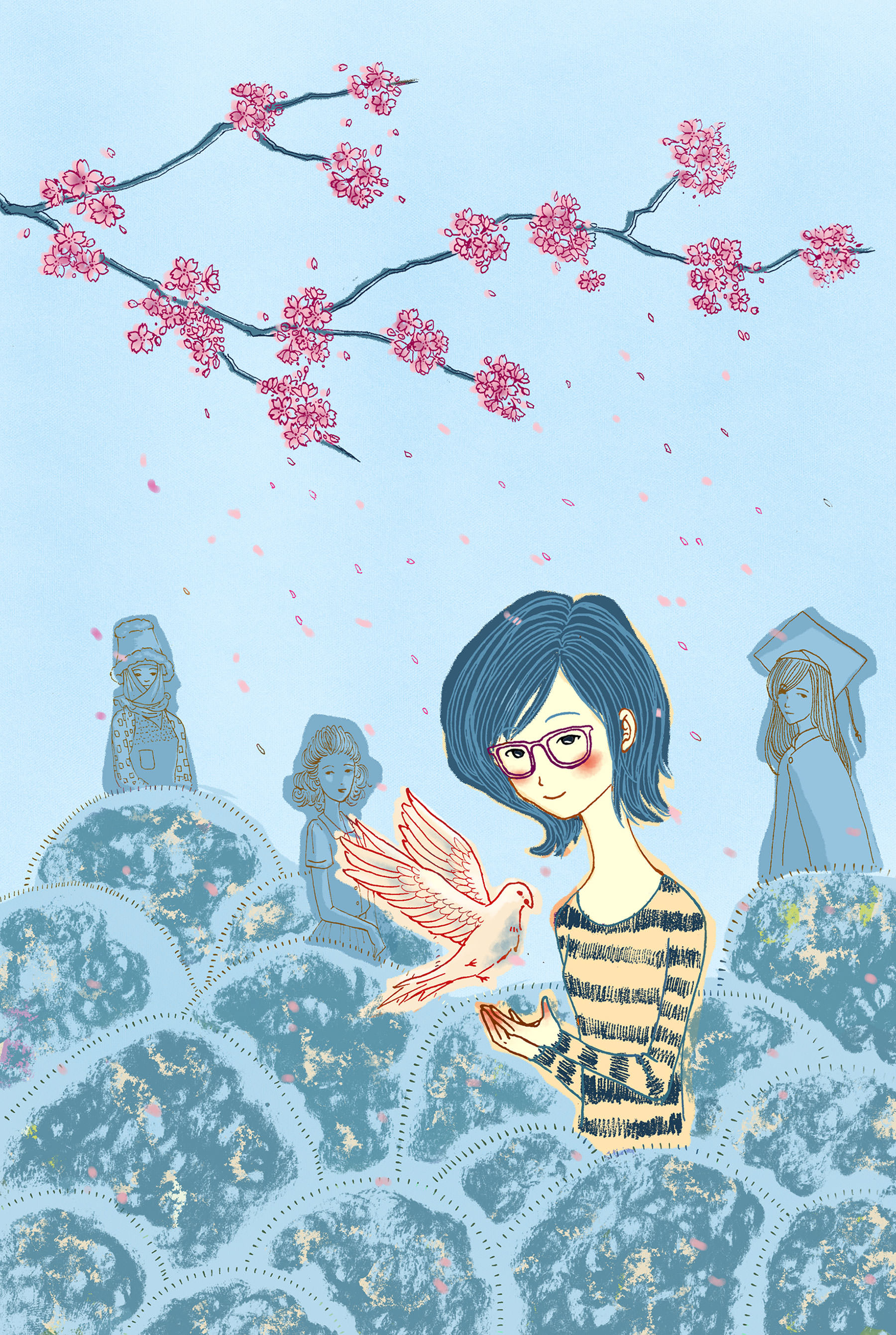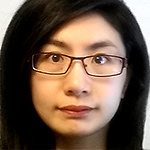
I don’t know much about my great-grandmother other than that she was an immigrant from Japan, born somewhere in the south near Fukuoka or Yamaguchi-ken. She married my great-grandfather, a second-generation Japanese American born in Hawaiʻi. He wasn’t a particularly nice guy nor successful in business, and was possibly abusive. She gave birth to one son and six daughters. She died young, suffering from kidney failure and perhaps poverty. She may also have been the first Christian in our family.
My Grandma Martha was the second of those seven kids. She was born in Sacramento, California, in 1924. After losing her mother at a young age, she and her older sister took responsibility of raising their younger siblings. When she graduated from high school in Oakland, California, her classmates named her “most gracious”.
Soon thereafter, war broke out with Japan. Our family was imprisoned first at Tanforan, a converted race track, and then at Topaz, in the desert of Utah. Grandma’s older sister peaced out and got married, and Grandma was left to raise the rest of her siblings. When the government allowed folks to leave camp but not return to the West Coast, Grandma got a job in Chicago where her siblings eventually joined her. Those years were hard, even according to my great-aunt who was still a kid at the time. Somehow, they all survived and came back home to California. Grandma worked at the Veterans Affairs in Honolulu after the war, where she met and married my Grandpa Kazuo. He worked as a house painter, and eventually they moved to Berkeley, California, to be close to the rest of the family.
It was difficult to make ends meet, but Grandma was a dedicated mother and regular volunteer at the Red Cross. She was known for her excellent cooking and crocheting. She struggled with mental health throughout her life, likely a byproduct of her hard life. She was also a devoted Christian.
My Mama Vera, as I fondly call her, grew up in a racially mixed working-class neighborhood in Berkeley. She fondly remembers going over to her best friend’s house, which was also a Black salon, and dancing to Motown. She rode her skateboard ad played basketball with the boys. She was recruited to play high school field hockey and basketball, but Grandpa said she needed to focus on her studies.

She was deeply aware of class differences — her dad worked in the trades — and the racism her family experienced. Grandpa painted houses in white neighborhoods and was picketed by the same union that would not allow him to join — of course, after he became successful. She tells stories of being accused of plagiarism multiple times in high school. In college, her advisor told her she would never become a lawyer. She went on to graduate Phi Beta Kappa from the University of California, Berkeley and had a successful career as an attorney with the State of California. She has been a devout Christian her entire life.
Lineages are an important part of the stories of the Bible. Who begot whom, begot whom. Most often, women are not included in these lineages. It is particularly rare for a marginalized woman to be part of this type of inheritance. In my family, it is important to note that Christianity has been passed down matrilineally, from my great-grandmother, to my grandmother, to my mother, to me. With it has come values of hard work, sacrifice, and frugality. The women in our family survived and thrived through ingenuity and creativity, generosity and faith.
I have inherited many of these values forged through this history. I approach life understanding that as an Asian American woman, I need to be twice as good in the face of racism. I am practical and frugal, clipping coupons and saving glass bottles for reuse.
My mom has always emphasized giving back and being part of the Japanese American community. For her, it was important that my brother and I grew up in the Japanese American church. She signed us up for a mother-daughter volunteer club that served meals to people in need and volunteered at nonprofit fundraisers. She made sure we were part of summer Japanese American school, where we learned about our culture and history. She paid for us to go to the best schools knowing that as people of color, education is something that could never be taken away. My mom and dad emphasized the sacrifice of our great-grandparents and grandparents who worked so we could live a better life.
It was a blessing to grow up in the Japanese American community in Berkeley, California. The community poured love into me, love I did not receive at prep school. I grew up in a progressive United Methodist church, with a mixed-race woman pastor educated at Harvard Divinity School. Every spring, I made curry and sushi along with octogenarian survivors of World War II. Every summer, I went to Daruma-no-Gakko, a volunteer-led summer school where I learned about being Japanese American. In my sixth grade year, I was so interested in history that my teacher, Ms. Dion, took me on for the next two years as her student aid. In high school, my mom encouraged me to join the local chapter of the Japanese American Citizens League. Its president, Valerie Yasukochi, encouraged my interest in Japanese American history and my growing passion for racial justice.

The women of my family and my community have given me an incredible inheritance. The gift of knowing where I come from. The awareness of the realities of racism and the challenges we face as Asian American women. The affirmation of my gifts and passions. A commitment to community and to justice. The strength and faith to continue on knowing that I am not the first person on this path.
Two years ago, I quit my consulting job on Wall Street to go to seminary. I already had a master’s degree in public policy and almost 10 years of work under my belt, but I felt a call to ministry back home in the Japanese American community. It was something I couldn’t ignore.
As part of my studies with Dr. Helen Jin Kim, I had the opportunity to explore the history of progressive Japanese American theology. For the first time, I read the writings of the Rev. Paul Nagano, Bishop Roy Sano, and the Rev. Lloyd Wake. I wrote a final paper this spring on Nagano’s early writings about Yellow theology, building upon Dr. James Cone’s seminal work in Black liberation theology. His personal experience of wartime incarceration and his connections between Black and Japanese American experiences brought me full circle back to my mom dancing to Motown as a working-class kid in Berkeley in the 1960s.
As a member of the National Japanese American United Methodist Caucus, I am in dialogue with other pastors and seminarians about the ministries of our historic Japanese American churches, like the one I was raised in. As the last of our grandparents’ generation passes away, and our parents’ generation retires, we face uncertainty. We are mourning the loss of our elders who spoke Japanese and survived incarceration. At the same time, we face the decline of the American church and the rise of xenophobia and white supremacy. Together, we are discerning God’s call for our ministries. We are discerning what it means to inherit this legacy, a legacy that has produced a progressive, multiracial, queer- and trans-affirming church.
I am filled with hope. I am filled with hope because of the women who have raised me and loved me. I am filled with hope because I have seen the ways that God has worked through our ministry. I am filled with hope because of the ways that God has empowered us to be loving and welcoming to others who experience oppression.
My Japanese American Christian inheritance is one of deep awareness of the sin of white supremacy, of greed, and of hatred. It is an awareness of my complicity in systems of oppression and my need for repentance and reconciliation. It is an awareness of the need to build coalitions, cross barriers, and have courage to stand with other people on the margins. It is a belief that the arc of the universe is long, but it bends toward justice. It is a belief in a God who created us in the image of the divine, a God who loves us, a God who calls us to love one another — a God who is with us in the struggle, working in individual lives and collective history, a God for whom no one is unredeemable or without hope.

Jessica Kawamura is a fourth-generation Japanese American Christian from Berkeley, California. After concentrating in ethnic studies at Brown University and studying Public Policy at the University of California, Berkeley, she worked for the U.S. Department of Health and Human Services, U.S. Department of the Treasury, and Ernst and Young. Currently, she is a third-year master of divinity candidate at Candler School of Theology at Emory University and an ordination candidate with the California-Nevada Conference of The United Methodist Church. She serves as the executive committee secretary of the National Japanese American United Methodist Caucus.

Ying Siu is an illustrator who grew up in Hong Kong and is now living in New York. Before becoming an illustrator, she was a flight attendant who loved to observe people’s behaviour. Her work can be found at yingsiu.com.